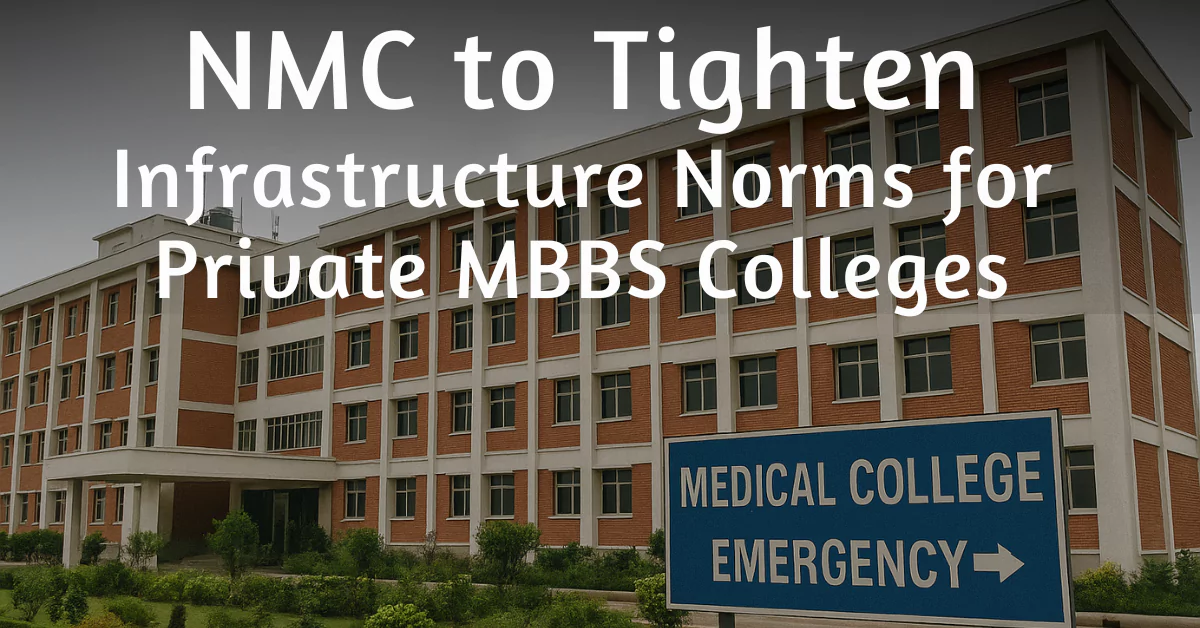NMC, Delhi: The National Medical Commission (NMC) is planning to introduce stricter infrastructure norms for private medical colleges, especially those seeking to increase their MBBS intake capacity. This move could reshape medical education quality in India in the coming future.
One of the key proposals: a mandatory minimum number of functional hospital beds directly attached to the college. This new criterion is expected to be enforced in the coming months, as part of NMC’s broader mission to enhance quality control in medical education.
Over the years, many private colleges have rapidly expanded MBBS seats without proportionate improvement in clinical infrastructure, especially hospital bed-to-student ratios. This has led to serious concerns regarding:
- Poor patient exposure for students
- Limited hands-on clinical training
- Diluted doctor-patient interaction during rotations
- Regulatory loopholes are being exploited via rented or PPP-mode hospitals
With India producing over 1 lakh MBBS graduates annually, maintaining clinical training quality is critically important for future doctors’ competence and public healthcare standards.
Current Infrastructure Gap: A Quick Glance
| Parameter | Govt. Colleges (Avg.) | Pvt. Colleges (Avg.) |
|---|---|---|
| Hospital beds per 100 MBBS seats | 500–750 beds | 250–400 beds (varies) |
| Patient footfall (per day) | 2,000+ | 800–1,500 |
| Intern satisfaction rate | High | Mixed reviews |
Expected New Norms
Sources close to the NMC infrastructure review committee suggest that the proposed minimum standards may include:
- Minimum 600 functional hospital beds for colleges with 150 MBBS seats
- At least 70% bed occupancy rate for clinical subjects like medicine, surgery, OBG, paediatrics
- In-house hospital infrastructure only: No more reliance on nearby “affiliated” private hospitals
- Mandatory live CCTV monitoring during inspections
- Public display of daily OPD/IPD numbers on college websites
If implemented, these norms will apply to:
- Colleges seeking fresh MBBS course approvals
- Colleges applying for seats increase from 100 to 150/200
- Renewal of permission beyond the 2nd academic year
“Many private colleges have mushroomed with barely enough patient load. Increasing seat count without hospital expansion is dangerous for medical training,”
says former chairperson, Delhi Medical Council.
“We welcome the move. Bed occupancy and patient diversity should drive seat expansion-not financial power,”
says Dean at a South Indian government medical college.
Potential Impact
| Impact Area | What It Means for Students |
|---|---|
| Reduced seat expansion | Fewer new MBBS seats in non-compliant colleges |
| Improved clinical exposure | Better hands-on learning opportunities |
| Higher admission competition | Less artificial seat inflation |
| Better PG readiness | More meaningful internship experiences |
Despite the positive intent, private medical institutions may resist implementation due to:
- High infrastructure costs
- Difficulty in increasing the real patient load
- Legal pushbacks or demands for transitional relief
Expect court cases, representation by private medical associations, and state government lobbying in the coming months.

